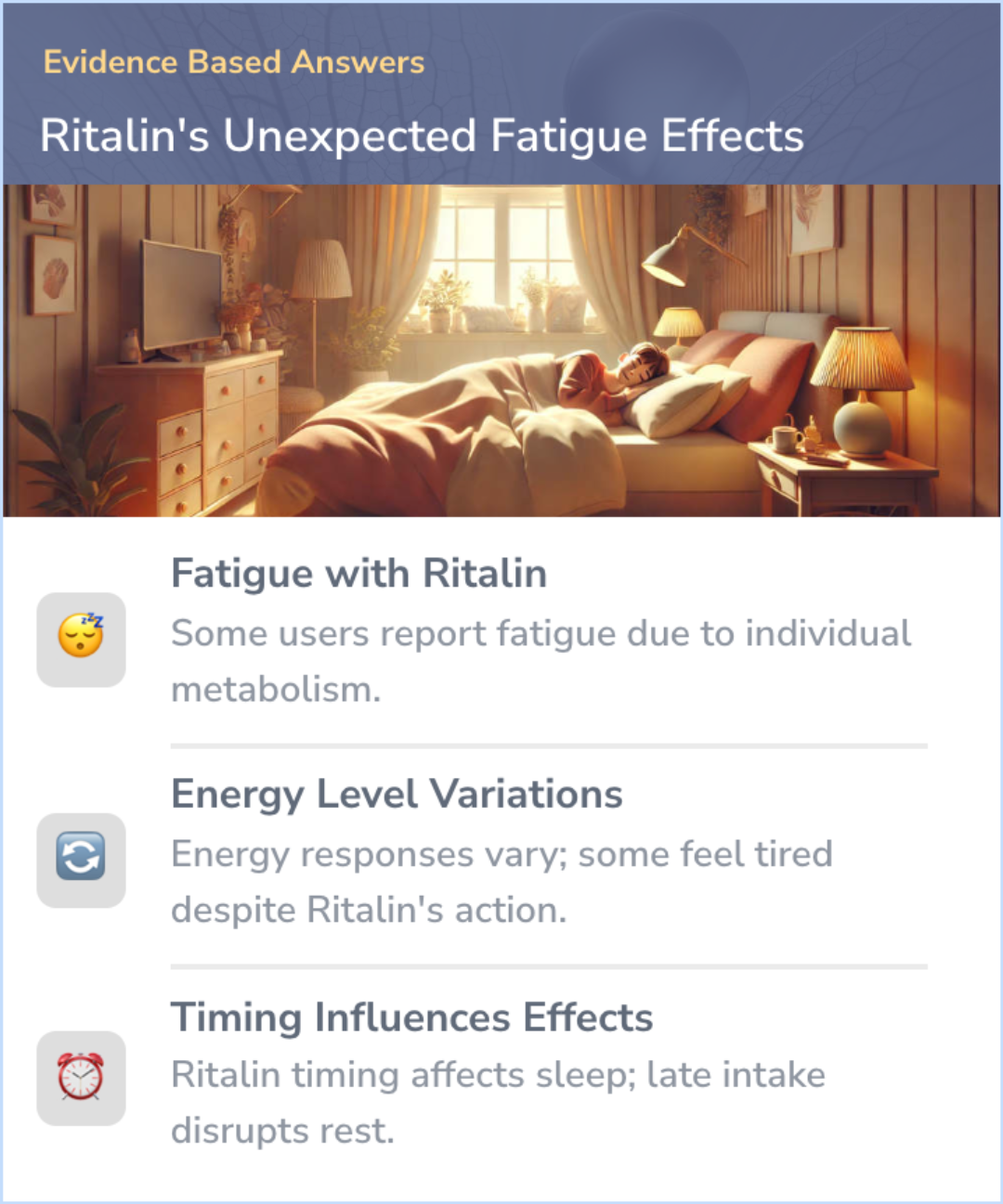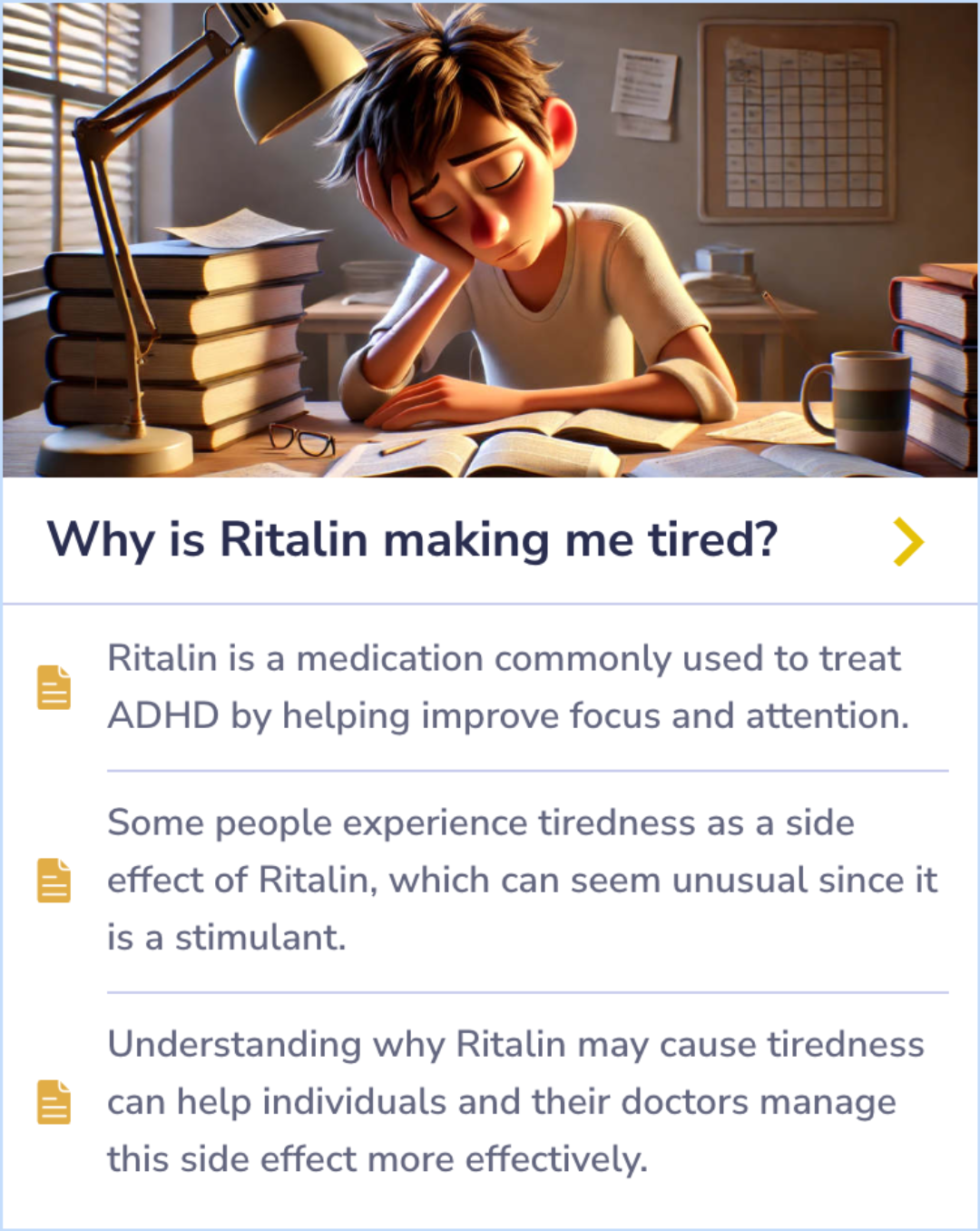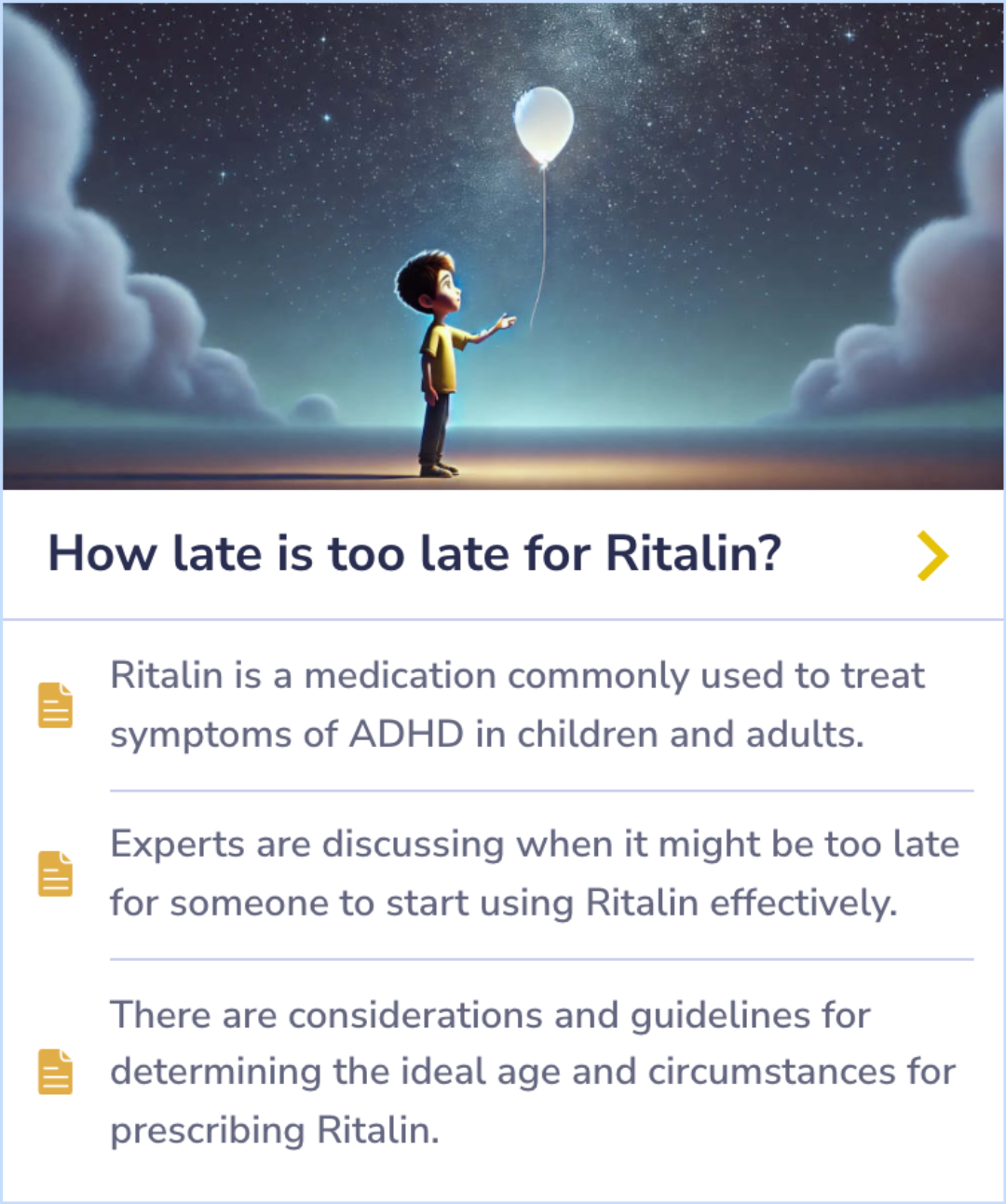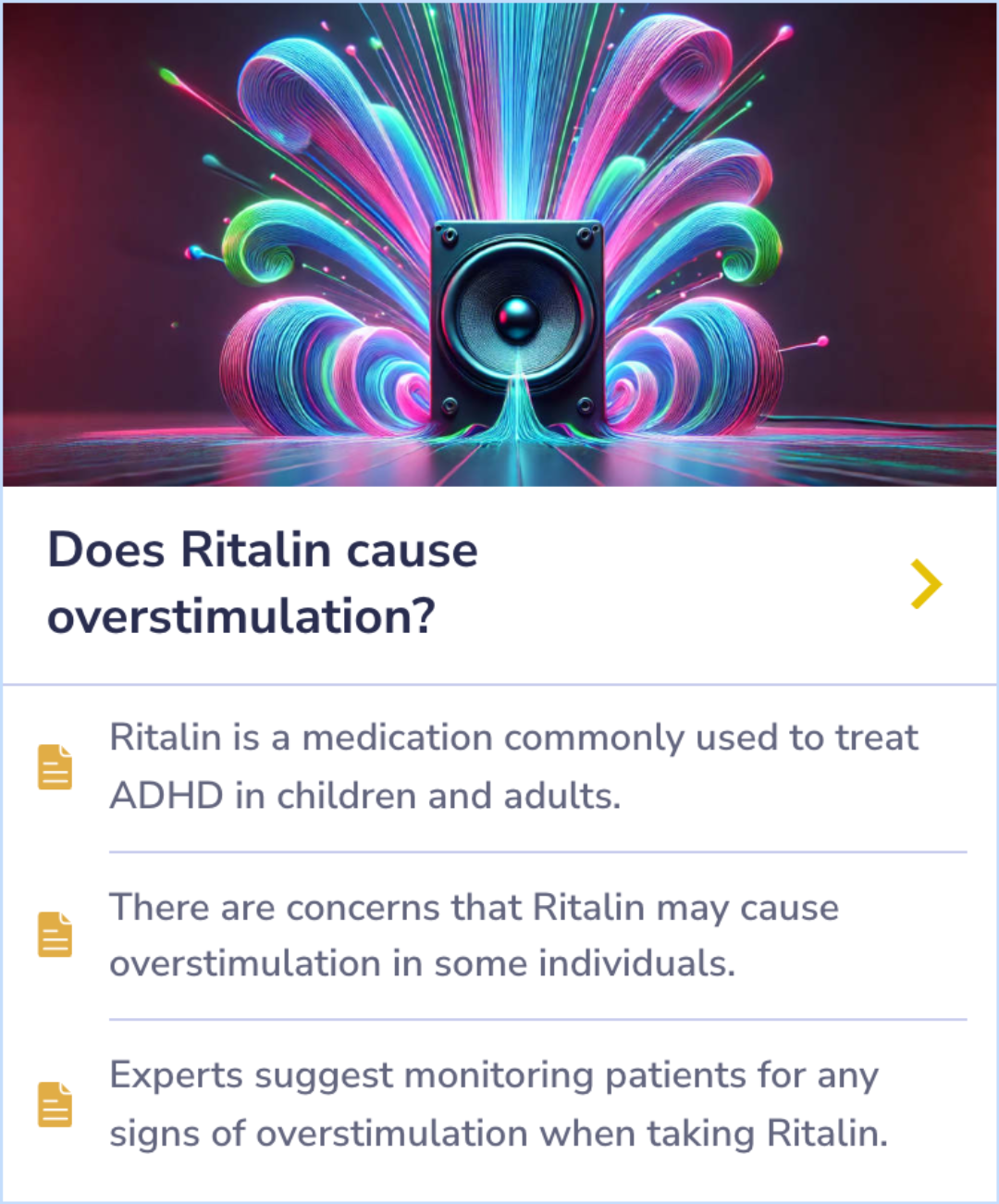Ritalin
Evidence Based Answers
Why do I fall asleep after taking Ritalin?
Ritalin increases alertness by boosting neurotransmitters but can cause fatigue in some due to metabolism differences. Timing and dosage adjustments may help manage these unexpected energy variations.
Published: November 8, 2024
Click to explore a section:

Ritalin's side effects include fatigue, impacted by metabolism, timing, and dosage.
Personal Experiences
Perspectives: Diverse Reactions to Ritalin and Sleep
In discussion on the effects of Ritalin, individuals share diverse experiences. Some report improved sleep quality and restful naps due to reduced anxiety and racing thoughts.
Conversely, others note excessive drowsiness, especially at lower doses, leading to concerns about medication efficacy and individual reactions. These varying perspectives highlight the complex relationship between Ritalin and sleep.
Conversely, others note excessive drowsiness, especially at lower doses, leading to concerns about medication efficacy and individual reactions. These varying perspectives highlight the complex relationship between Ritalin and sleep.
Reddit: u/pickleknits
For me it was more that my mind was quiet and I could unwind and I snoozed.Understanding Fatigue with Ritalin
Ritalin is primarily used to increase alertness by enhancing norepinephrine and dopamine levels. However, some individuals may experience fatigue or drowsiness instead. This response can vary based on individual differences in how Ritalin is metabolized.
For some, feelings of tiredness or anxiety may arise, which is a known reaction to this medication.
For some, feelings of tiredness or anxiety may arise, which is a known reaction to this medication.
It is, however, subject to marked individual differences in the response so that some subjects experience anxiety, dysphoria and tiredness.
Mechanism of Action and Energy Levels
Ritalin works by inhibiting the reuptake of dopamine and norepinephrine, increasing their activity in the brain. This mechanism can affect energy levels differently; some people may feel more energized, while others could experience fatigue.
The effects on metabolic activity highlight the varied responses to Ritalin.
The effects on metabolic activity highlight the varied responses to Ritalin.
“
Source Quotes:
The established actions of methylphenidate are at the noradrenaline and dopamine transporters where the drug acts as a reuptake inhibitor to increase the extracellular concentrations of noradrenaline and dopamine, respectively.
Methylphenidate blocks the reuptake of two neurotransmitters, norepinephrine (NE) and dopamine, in presynaptic neurons.
Fatigue as a Potential Side Effect
Although Ritalin is intended to boost alertness, some users report fatigue as a side effect. This can depend on factors such as dosage and individual reactions.
Adjustments to the timing or formulation may help reduce fatigue for certain individuals.
Adjustments to the timing or formulation may help reduce fatigue for certain individuals.
“
Source Quotes:
Other reactions include hypersensitivity...; dizziness; palpitations; headache; dyskinesia; drowsiness; blood pressure and pulse changes, both up and down;
Patients are more prone to become easily agitated, irritable, or depressed and go through mood swings/lability.
Timing and Dosage Effects
The timing of Ritalin intake plays a role in energy and alertness. Taking it later in the day can interfere with sleep, while fatigue may still occur for some regardless of timing.
Adjusting the dosage schedule or using short-acting forms may help better manage these effects.
Adjusting the dosage schedule or using short-acting forms may help better manage these effects.
“
Source Quotes:
Notably, some patients may find it beneficial to take low doses of short-acting MPH in the evening, in order to become more peaceful and, hence, more likely to fall asleep.
Side effects of stimulants reported in adults treated for ADHD include dry mouth, insomnia (particularly if the duration of medication effects extends into the evening or if the medication is taken late during the day), irritability, dysphoria, diminished appetite, weight loss, and headaches.
Background: Indications
Ritalin is often prescribed as part of a comprehensive treatment plan. It is used primarily for managing attention-deficit/hyperactivity disorder (ADHD), which affects focus and energy levels. This can help improve attention and manage impulsive behavior.
Additionally, Ritalin is also approved for treating narcolepsy, a sleep disorder characterized by excessive daytime sleepiness. The dual usage highlights its role in disorders affecting energy and alertness.
Additionally, Ritalin is also approved for treating narcolepsy, a sleep disorder characterized by excessive daytime sleepiness. The dual usage highlights its role in disorders affecting energy and alertness.
Key Takeaways
Conclusions
Ritalin is intended to enhance alertness by boosting norepinephrine and dopamine activity. Yet, individual responses vary, with some experiencing fatigue or drowsiness due to unique metabolic processing.
Factors such as dosage, timing of intake, and personal chemistry play roles in these diverse reactions. Adjustments in these areas could potentially mitigate fatigue as a side effect.
Factors such as dosage, timing of intake, and personal chemistry play roles in these diverse reactions. Adjustments in these areas could potentially mitigate fatigue as a side effect.

Evidence Summary
Unexpected Tiredness from Ritalin
Ritalin is prescribed to improve focus and attention in individuals with ADHD. Despite being a stimulant, it can lead to unexpected tiredness in some users, a side effect that may seem contradictory to its intended purpose.
While enhancing focus, certain individuals experience fatigue, highlighting the diverse responses to the medication. Exploring this helps patients and healthcare providers navigate daily challenges more effectively.
While enhancing focus, certain individuals experience fatigue, highlighting the diverse responses to the medication. Exploring this helps patients and healthcare providers navigate daily challenges more effectively.
Evidence Summary
Timing and Effectiveness of Ritalin Treatment
Ritalin is a common treatment for ADHD, but there is ongoing discussion about the best age to begin therapy to maximize its effectiveness and ensure safety. Guidelines offer direction on when starting Ritalin may no longer be optimal.
Age considerations and expert recommendations are in place to guide the timing of treatment, emphasizing both therapeutic impact and potential safety concerns when prescribing Ritalin.
Discussions focus on when Ritalin initiation is most beneficial and how timing affects its outcomes.
Age considerations and expert recommendations are in place to guide the timing of treatment, emphasizing both therapeutic impact and potential safety concerns when prescribing Ritalin.
Discussions focus on when Ritalin initiation is most beneficial and how timing affects its outcomes.
Evidence Summary
Monitoring Ritalin for Overstimulation Risks
Ritalin is widely prescribed to treat ADHD in both children and adults. However, some individuals may experience overstimulation, which can manifest in various ways. Monitoring patients closely is recommended to identify signs of overstimulation early.
Experts emphasize that careful oversight of Ritalin treatment can help manage any potential overstimulation effects, ensuring that therapy remains effective and safe.
Experts emphasize that careful oversight of Ritalin treatment can help manage any potential overstimulation effects, ensuring that therapy remains effective and safe.


